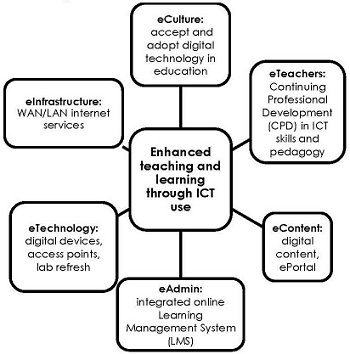| 1.1 |
In an effort to improve opportunities and address some of the challenges facing the citizens of the province, the Western Cape Government (WCG) has identified seven interventions or "game-changers" designed to effectively shift the way these issues are addressed currently. The seven catalysts or game-changers are:
- Expanding apprenticeships
- Achieving energy security
- Delivering high speed broadband
- Implementing quality eLearning at schools
- Expanding quality after-school activities
- Pioneering a better living model
- Reducing alcohol related harms
|
| 1.2 |
The WCG and the Western Cape Education Department (WCED) are laying the foundation for eLearning in the province over the next three-year period. This will facilitate access to digital teaching and learning resources and support, which will contribute towards the vision of creating a "highly skilled, innovation-driven, resourceefficient, high-opportunity society for all". |
| 2. |
The eLearning game-changer |
| 2.1 |
The eLearning game-changer articulates the commitment made by the WCED to expand on its existing technology base and digital resources in order to create virtual learning environments at schools as a strategic priority. |
| 2.2 |
The eLearning game-changer focuses on six streams to achieve this, namely the creation of an eCulture in schools backed by eInfrastructure, an eAdmin system to run the school, and well-trained eTeachers using eTechnology and eContent in their lessons.
Figure 1: eLearning Streams

|
| 3.1 |
The WCG has committed to initially providing high-speed broadband connectivity to almost every school in the province via a Wide Area Network (WAN) and Local Area Network (LAN) with Wi-Fi connectivity to almost every site. Alternative connectivity will initially be provided to schools that cannot connect to the fibre-optic grid. |
| 3.2 |
The WCED has provisionally adopted a staggered, targeted, solution-orientated approach which will drive the results-focused delivery of the eLearning roll-out which may include refreshing current computer technology, equipping smart classrooms, providing learner and teacher devices as well as developing and providing teacher-specific technology training and development. |
| 3.3 |
The WCED is providing access to digital teaching and learning materials via an ePortal and will work with teachers and content developers to populate the portal progressively with CAPS-aligned digital resources. |
| 4.1 |
In order to accelerate the delivery of access to a digitally enabled environment, schools have provisionally been divided into three categories namely, universal, enhanced and model schools. |
| 4.2 |
Universal schools will initially have basic access to the internet through a computer lab or an Information and Communication Technology (ICT) suite. In these schools, the WCG will give learners and teachers access to digital resources through WAN via labs and central Wi-Fi access points. |
| 4.3 |
Enhanced schools are those schools who have or will be receiving LAN over the period of the game-changer. LAN facilitates access to WAN and allows wireless connectivity in classrooms. Teachers will initially receive devices to take advantage of this access and learners may be allowed access through a Bring your Own Device (BYOD) model. |
| 4.4 |
Model schools will implement the full eLearning environment, integrating eLearning into their teaching practices, developing and contributing eContent, establishing an eCulture and developing best practice processes that will be beneficial to schools in the long term. |
| 4.5 |
Schools will progress from Universal to Enhanced and then to Model schools over time, either through WCED roll-out or own/donor funding. |
| 5. |
Continuous Professional eTeacher Development |
| 5.1 |
The WCED has committed to developing a teacher-specific ICT training path based on the competency levels of each teacher that have been identified through an online ICT assessment tool. |
| 5.2 |
Highly competent eTeachers form the backbone of the success of the eLearning game-changer thus training and development of not only the necessary ICT skills, but also the pedagogical application of these in the classroom environment is a WCED imperative to which all teachers are expected to fully commit and support. |
| 6. |
School readiness
A recent survey conducted by the Delivery Support Unit of the Department of the Premier revealed that:
- 85% of both teachers and principals indicated that they thought their school was ready for eLearning;
- 91% of teachers and 99% of principals who responded think that eLearning is helpful to enhance teaching and learning;
- 53% of teachers have indicated that an ICT committee has been appointed;
- 52% of teachers have indicated that their school does not have an ICT policy for technology enabled classrooms; and
- 66% of teachers indicated that they use ICT to do lesson planning.
|
| 7. |
Actions
In light of these findings, principals are encouraged to address:
- the contents of this circular with their staff and the governing body;
- those areas within the School Development Plan that deal with technology enabling activities;
- matters of security;
- pre-existing electrical issues;
- preparation of classrooms/labs for ICT;
- ICT policies; and
- other school-specific ICT matters.
|
| 8. |
Communication
Over the next three-year period information sessions will be held and communiques sent out that will highlight the development of the eLearning game-changer and schoolsˇ¦ positions in the roll-out. |
SIGNED: BK SCHREUDER
ACTING HEAD: EDUCATION
DATE: 2016:09:22
|
 |
